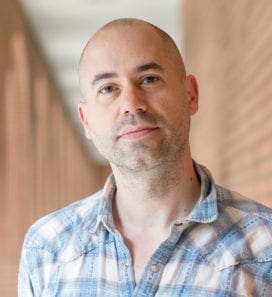Faculty

Marc Vermulst, PhD
Assistant Professor of Gerontology, Molecular and Computational Biology, Biological Sciences and Biochemistry and Molecular Medicine
Education
- Post-doctoral training, California Institute of Technology, 2008-2009 and the University of North Carolina, Chapel Hill, 2009-2013
- PhD, University of Washington, Seattle, 2004-2008
Research
- Systematic analysis of the origins and consequences of transcription errors on human aging and disease
- Understanding the dynamics of DNA repair and mutagenesis
- Understanding the timing of mitochondrial mutagenesis in human pathology
- Elucidating the molecular mechanisms that control protein homogeneity in organelles
Overview
Marc Vermulst, PhD, trained at the University of Washington in Seattle under the guidance of Lawrence Loeb and Jason Bielas. He held his first faculty position at the University of Pennsylvania and the Children’s Hospital of Philadelphia from 2013 to 2018. He received numerous awards for his research, from the NIH, the NIA and AFAR. He is currently focused on understanding the impact of biological errors on cellular and organismal function.
The primary goal of the Vermulst laboratory is to identify the basic mechanisms that control human aging. The identification of these mechanisms would provide pivotal insight into the etiology of numerous age-related diseases, including cancer, neurodegeneration and heart disease. Thus, by elucidating the basic biology that underlies human aging, it may be possible to provide new treatments for various diseases that are currently endemic in Western society. This rationale shapes the research performed in the lab and ensures that it always operates at the crossroads between basic biology and medical urgency.
The Vermulst laboratory focuses primarily on the effect of biological errors in human aging and disease. Many age-related diseases, including Alzheimer’s disease and Parkinson’s disease, are caused by proteotoxic stress. When examined, the neuronal networks of these patients are crowded with protein aggregations that impair cognitive function. To delay the progression of these diseases, and ultimately to prevent them, it will be important to understand how protein aggregation is initiated. We have found a link between transcription errors and proteotoxic stress that helps explain the etiology of these diseases.
Another area of interest is mitochondrial mutagenesis. Mitochondria are frequently called the powerhouses of our cells. They supply our cells with energy and mediate numerous processes that are essential to human health. As we grow older, mitochondria decline in function, and this can have a negative effect on cells with a high metabolic load, especially muscle fibers and neurons. Although the mechanisms behind this age-related decline are unclear, it is thought that instability of mitochondrial DNA is a central component of this problem. A major goal of the lab is to unravel mtDNA genetics at a subcellular level to understand why mitochondrial function declines in aging muscle cells and neurons.

